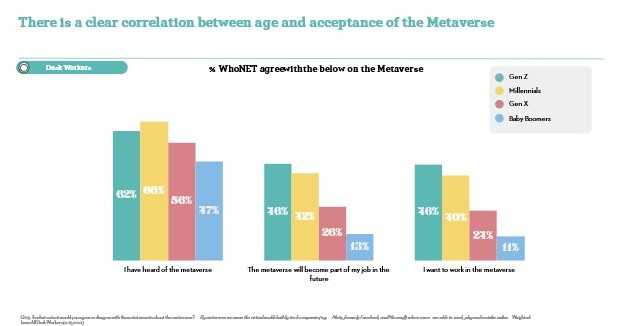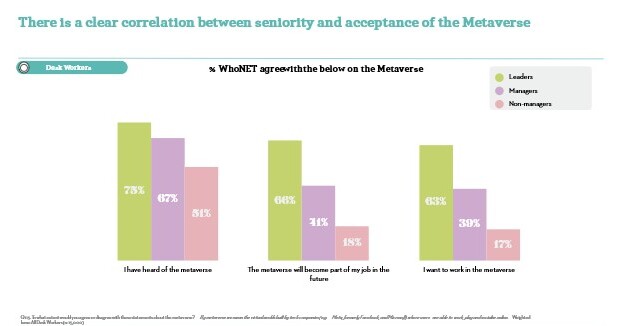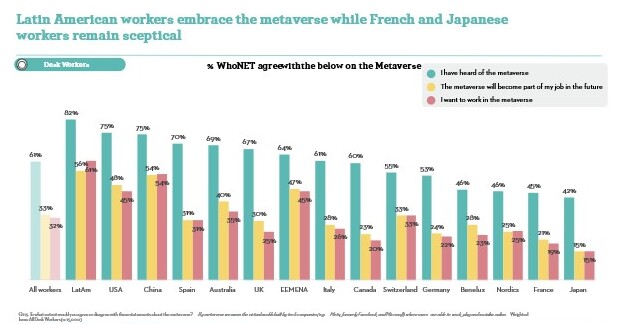The metaverse combines many technologies to experience how we use tech and interact with it across many facets of our lives from social relationships to entertainment, gaming to fitness, and work to education to commerce.
In our recent study, we defined the metaverse as “the virtual worlds built by tech companies (e.g. Meta, formerly Facebook, and Microsoft) where users are able to work, play and socialise online.”
Essentially, virtual reality and mixed reality are accessed via a browser or headset to have interactive experiences in real-time regardless of your geographic location. Currently, it’s in its infancy with several metaverses with their own avatars, access, currency, and more. This is similar to the early days of the internet when users of America Online, for example, were unable to interface with users of competing services. Eventually, the internet surpassed all of them; experts believe the metaverse will follow this path.
As the metaverse continues to evolve and mature, the trajectory is primed for tremendous growth. According to a McKinsey study, it could be worth $5 trillion by 2030! For perspective, that’s equivalent to the gross domestic product of Japan.
So how many people know about the metaverse?
Our study revealed a correlation between age, awareness, and acceptance of the metaverse. For instance, 62%of Gen Zers have heard of the metaverse and 46% of them say it will be part of their job in the future. Millennials possess similar sentiments, which are in stark comparison to older generations’ views:

Joshua Morley, National Practice Lead Director – Internet of Things & Digital Twins, said when it comes to virtually representing yourself through an avatar and customizing physical traits to reflect and interact with people, the “younger generations are a lot more abstract about how they represent their identity and things like that. That can come through current platforms, through things such as filters.”
For older generations, it’s about learning. “I heard a quote that I resonated with—'everything is ‘figure out-able,’” Morley said. That describes quite well a generational difference in learning new technologies. That mindset is something “that will lend itself not only to the adoption of the metaverse, but for other emerging technologies on the horizon.”
In addition to generational differences, non-managers, managers and leaders also have varying views. Seniority does appear to play a role in both familiarity and acceptance. 75% of leaders are familiar with the metaverse, compared to 51% of non-managers. Further, 66% of leaders are confident the metaverse will become part of their job in the future, compared to just 18% of non-managers.

Morley attributes the higher leadership numbers to exposure to different information sources.
“If leaders are more likely to be reading the Harvard Business Review, Gartner, and Big Four reports, the information conveyed from those sources is going be a lot more strategic,” he said. “It’s going to be centered around how to use it as a tool for remote and hybrid work or productivity.”
On the other hand, Morley pointed out, non-managers might receive information from sources such as mainstream media that talk about video games or social media rooms.

Morley added the scope of work is a factor, too.
“I think about my current role and where I'll be probably in the next five years to a decade,” he said. “I can't imagine too much of mine outside of meeting rooms and board meetings will be on the metaverse, but almost certainly there'll be roles within my reporting line that will heavily rely on metaverse technologies or augmented tech reality—remote operations, school, and education for virtual learning.”
When it comes to the metaverse, geography matters
Latin America leads the charge when it comes to awareness of and openness to the metaverse—82% of respondents have heard of the metaverse. In addition to the high awareness in Latin America, 56%of respondents believe it will become part of their job and even more (61%) want it to happen. This is the only geographic area that “wants it to” surpasses the “thinks it will” data.

“I think Latin American countries have done a fantastic job of providing both training and education for their population of the metaverse,” Morley said. “Brazil and Mexico in particular have had great success investing in metaverse tech.”
Another consideration, Morley, said is a culture of mistrust of employees and employers.
“That’s huge in some western nations, especially the USA,” he said. “There was a survey where a majority of workers believe that their employer would abuse a metaverse working arrangement to gather data on their work habits or on a personal nature -- things like that.”
Prepare for the inevitable
As our data reveals insight into the generations, levels of workers, and more, there’s no doubt the metaverse is evolving and growing as new jobs in the metaverse are emerging. It’s in everyone’s best interest—workers and leaders alike across the globe—to prepare for and position their skills and careers to embrace the future.
To read our full Global Workforce of the Future report, click here.
.jpg?h=534&iar=0&w=1920&hash=48BB61EB9D9F88070A728EE7AFB25280)


